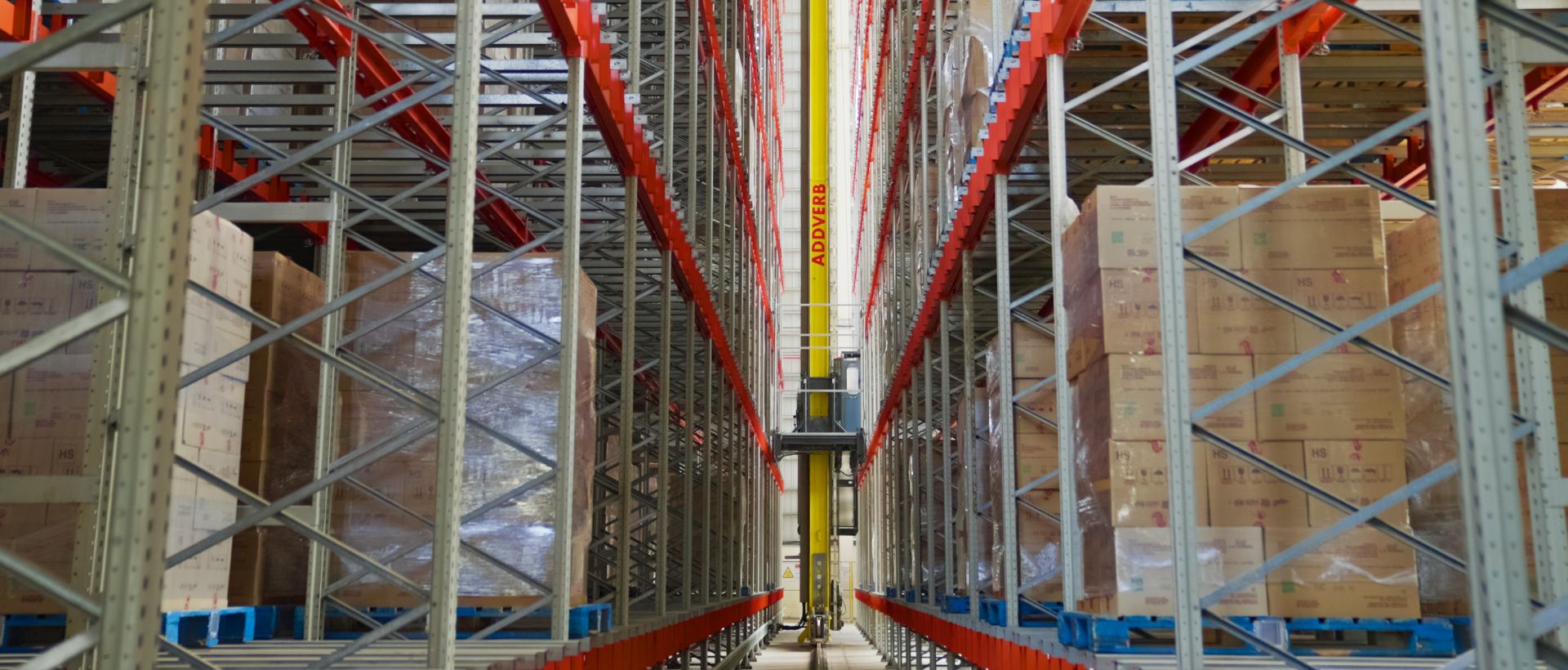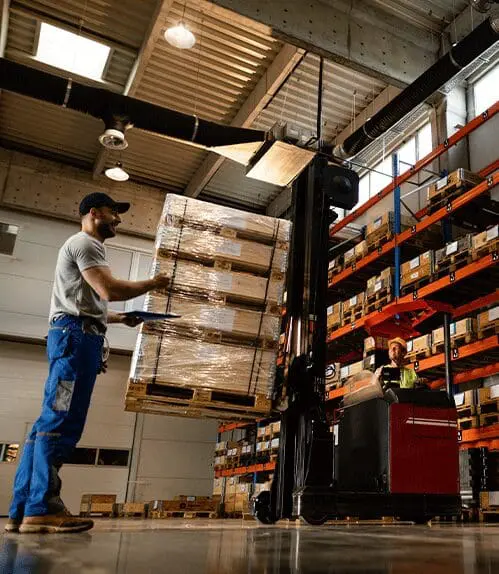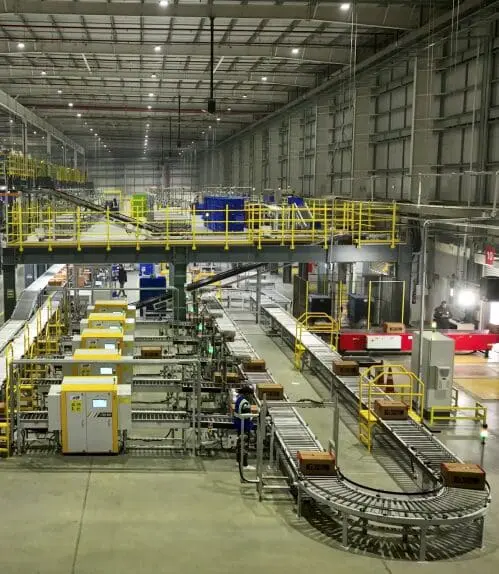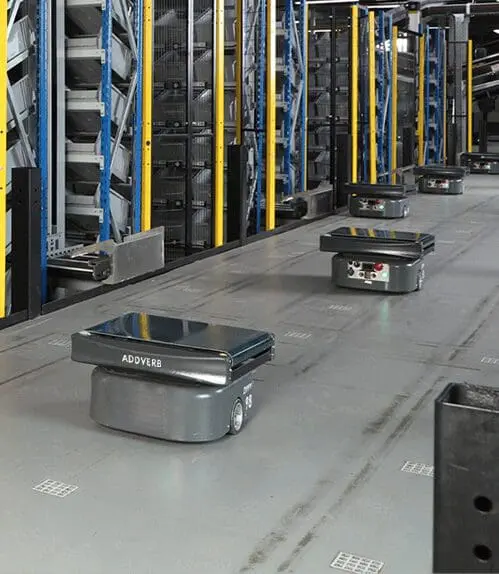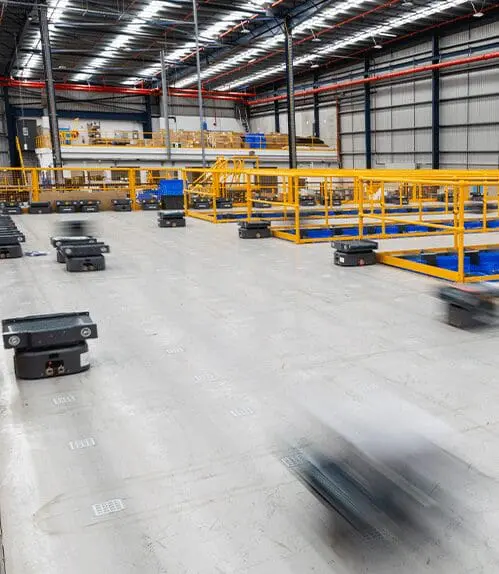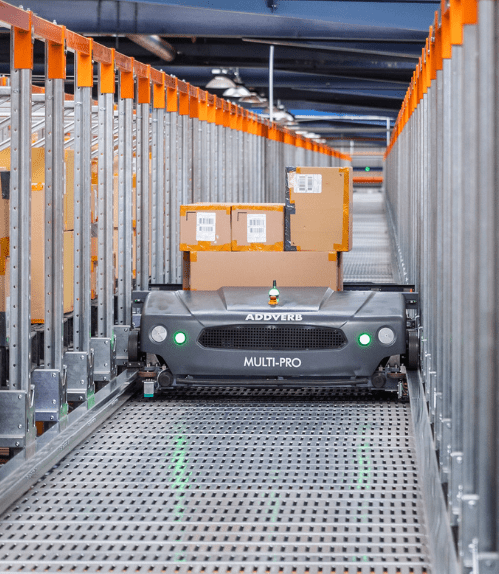Índice
Is your manual solar and battery warehousing holding you back?
Research demonstrates that 10-20% of solar panels get damaged due to incorrect handling, stacking, or transport in manual warehouses. (Source: Frost & Sullivan)
Relying on manual processes can lead to slow performance, high labor costs, product damage, and other issues. Read through the blog to unravel how automation will improve productivity, cost efficiency, and safety in your solar and battery warehousing.
Key Challenges in Solar and Battery Warehousing
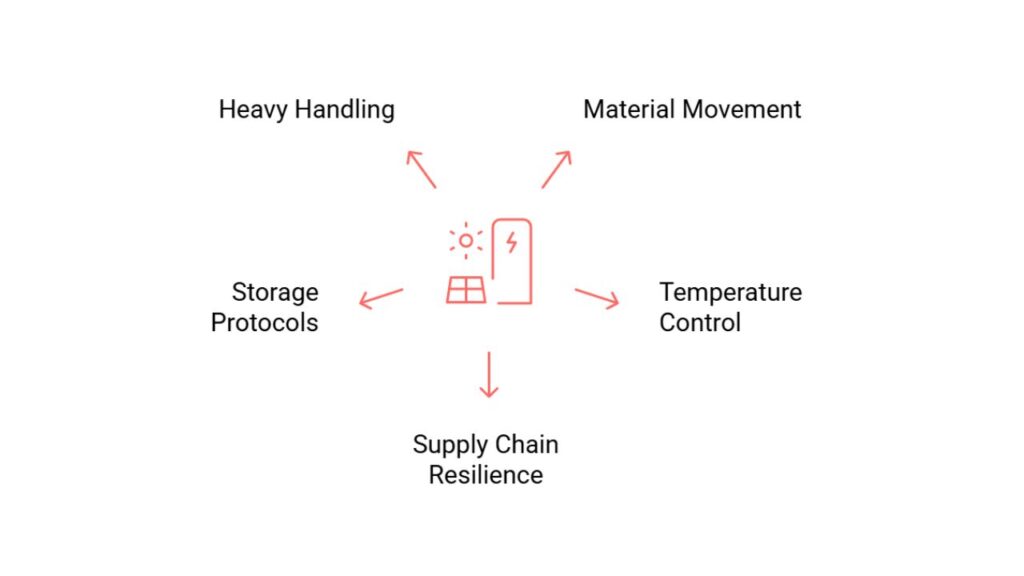
Movement of Materials: Solar panels and batteries are fragile and easily damaged when they are not handled properly or packaged well inside warehouses that can move things around. This makes it more likely that the products will fail or work later than planned.
Temperature-Controlled Environments: Solar panels and batteries are sensitive to the extreme temperature. In addition to providing such safe environments, specific attention should be directed to lithium batteries, especially the possibility of being treated as dangerous in storage.
15-20% of the warehouse battery failures arise out of improper temperature and humidity control in the warehouse (Source: Battery University).
Supply Chain Disruption and Resilience: All solar and battery warehousing products fall within a supply chain, which is prone to interruption because of a variety of factors, including natural disasters and either logistics bottlenecks or geopolitical issues.
Protocols for Storage and Handling: In warehouses, strict rules are complied with to make sure that dangerous materials, like lithium batteries, are stored safely. These rules are part of many health and safety standards.
Heavy Material Handling: Solar panels and batteries are usually heavy, requiring special equipment and trained staff for stacking, handling, and safe transport—resulting in increased operational complexity and costs.
Warehouse Requirements in Solar and Battery Industries
Movimiento de materiales
- Control Equipment: They play a pivotal role as they help to move large, heavy items and delicate goods as well. Warehouses need to equip forklifts, pallet jackets, and AMRs to prevent damage.
- Packing & Protection: Proper packing with foam and cushioning plays a key role in transporting the goods across the warehouse without any possible damages.
- Flow Optimization: Proper layout design enables the optimal ways of handling things with minimum handling and risk before they are carried into storage and staging areas.
Almacenamiento
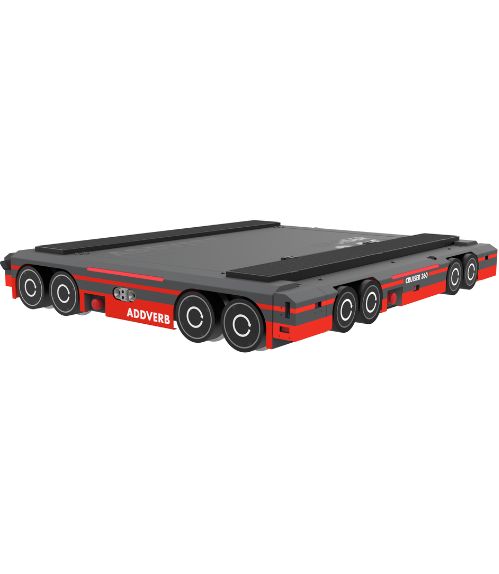
Temperature Regulation: To prevent degradation and potential hazards, store solar panels and batteries in climatised environments (15-25°C).
Humidity Management: In order to prevent instances of corrosion, limited humidity levels are very important, especially for solar panels.
Fire safety: This implies fire suppression systems and safe storage for batteries, particularly in the case of lithium-ion batteries that are prone to fires.
Racking Systems: Racks that prevent physical damage towards solar panels and batteries while optimizing space are required.
Software Solutions
Extensive software solutions are required for the efficient management of automated, modernised warehouses.
Such systems enable the smooth flow of operations, increased productivity, and seamless end-to-end visibility throughout the supply chain.
Here are some key imperative requirements for software solutions in the warehouse environment:
- Warehouse Control System (WCS): Controls all the automated systems in the warehouse and manages their integration with robotics and material handling.
- Fleet Management System (FMS): Manages fleets of mobile robots and provides an improvement in efficiency and downtime.
Automation Solutions for Solar and Battery Warehousing
Material Movement Solution with Mobile Robots
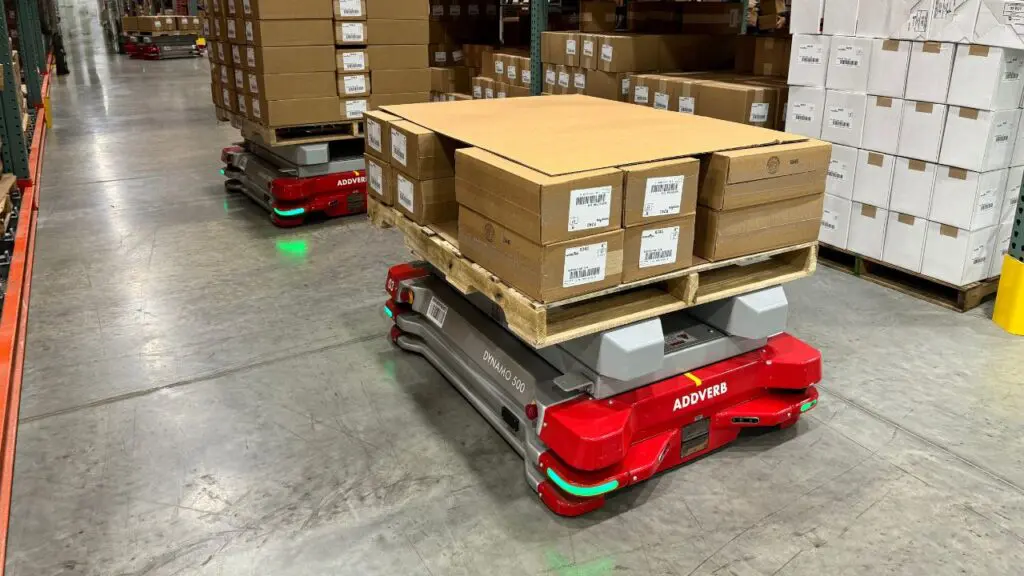
Autonomous Mobile Robots (AMRs) redefine material movement within solar and battery warehousing.
For delivering heavy and delicate materials such as solar panels and batteries, Dynamo from Addverb—with a payload of 2500 kg and LiDAR-based navigation—is actively used in warehouse workflow optimization.
We have Veloce, an intelligent robot for multiple carton picking in grocery superdensity storage to unload its cartons, whether small or large totes or crates.
Veloce operates mainly in grid technology to access narrow aisles to allow double-deep storage and retrieval of goods, thereby creating an opportunity for increasing space optimization and accuracy in goods retrieval from people.
Thus, all these robots operatively augment the efficiency of work by reducing human workers and exploiting the spaces within the warehouses.
Storage Solution with Automated Storage and Retrieval Systems (ASRS)
Automated Storage and Retrieval Systems (ASRS) of Addverb can offer significant benefits for solar and battery warehousing by improving the efficiency of storage.
Mother-Child Shuttle: As the Mother Shuttle carries Child Shuttles, it improves space utilisation and decreases manual handling.
Carton Shuttles: Accommodate cartons, crates, or totes of all possible sizes into prime real estate, optimizing their safe storage and retrieval for solar panels, battery packs, and accessories.
4-way Pallet Shuttle: Storage efficiency for bulky items is enhanced—for solar panels and large batteries—by accepting movement in four directions and enabling double-deep storage, using space maximally to store bulky items, and even in very narrow aisles.
Multi-Level Shuttle: This is efficient for vertical space usage, allowing multi-tier storage of solar panels and batteries, maximising warehouse storage height.
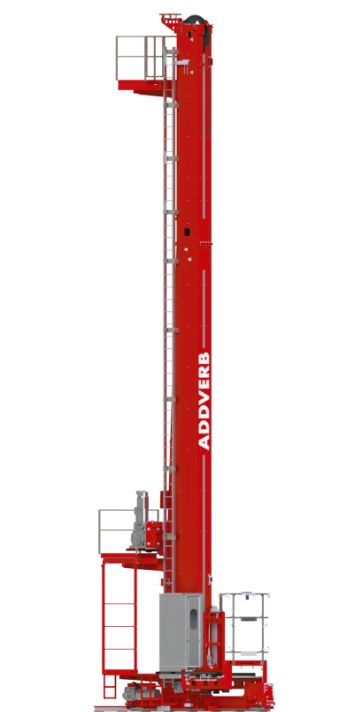
Pallet Shuttle: This automated moving system is used that potentially moves heavy palletised goods, making them densified in storage, fast in retrieval, and at the same time minimising human movement, highly applicable for huge solar and battery products.
These ASRS solutions add storage efficiency, speed, and safety to handling solar and battery warehousing to achieve more effective operations and productivity in managing inventory.
How Automation Solves Key Solar and Battery Warehousing Challenges?
Minimise the Damage: By using automation, it thereby reduces the damage to all fragile solar panels or sensitive batteries with its breakthrough solutions.
Keep the Temperature and Product Integrity Constant: Automated air conditioning keeps all products—solar panels and lithium-ion batteries—away from sudden temperature changes that can ensure their integrity.
Increase resilience in the supply chains. Automated systems will enhance the supply chain’s response time by providing visibility, flexibility, and real-time disruption.
Monitoring the Inventory: Accurate and real-time inventory management to eliminate errors and accelerate stock control by automated monitoring with RFID and barcode scanning.
Conclusión
Solar and battery warehousing have been revolutionised and transformed through automation by making them efficient, less damage-prone, and keeping temperatures well controlled.
Solutions like AMR and ASRS can optimise storage in the warehouse while enhancing safety and functional productivity. Addverb puts forward futuristic automation solutions to re-engineer warehouse operations. Visit Addverb to understand how we can help streamline your processes and improve performance.

PREGUNTAS FRECUENTES
Why is proper warehousing critical for solar and batteries?
Improper handling, stacking, and environmental conditions like high humidity or temperature fluctuations can damage solar panels and batteries, reducing efficiency and lifespan. Advanced warehousing solutions ensure safe storage and handling.
How can automation reduce damage in solar and battery warehousing?
Automation eliminates manual errors in stacking and handling, uses precise robotic systems for movement, and ensures secure storage to prevent micro-cracks or physical damage.
What role does temperature control play in solar and battery warehousing?
Temperature control is vital to prevent degradation. Batteries stored in extreme temperatures or high humidity may lose efficiency or fail prematurely. Automated systems monitor and maintain ideal conditions.
Can Addverb’s solutions support renewable energy in solar and battery warehousing?
Yes, Addverb offers tailored automation solutions, including smart storage systems and robotic handling, designed to optimize operations and ensure the safe storage of solar panels and batteries.
What are the benefits of using Addverb’s automated warehousing for batteries?
Addverb’s systems enhance safety, ensure proper temperature and humidity control, reduce manual labor, and improve inventory management to extend battery life and reduce wastage.
